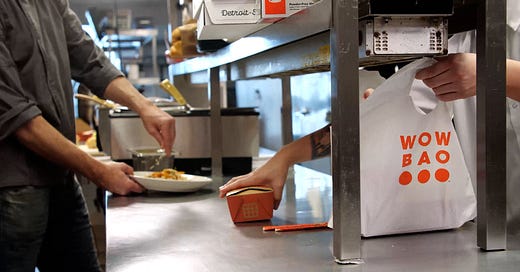Lessons from a ghost kitchen leader: a Q&A
Wow Bao's Geoff Alexander explains why the business is far — far! — from dead.
On Wednesday, I alluded to a spicy exchange onstage during my future-restaurant panel at CES. The topic that got heated was one I didn’t expect to spend much time talking about: ghost kitchens and virtual brands. The once white-hot sector has cooled lately as big players have stumbled1 and a vision of the future — a future once valued by Euromonitor at $1 trillion in less than a decade — shifted dramatically.
Detractors, including a different panelist, point to recent failures as a sign that the ghost kitchen business-that-could turned into the disruption-that-wasn’t. Onstage, Wow Bao president and CEO Geoff Alexander defended the idea that’s at different times been chronicled as game-changing, industry-saving, over-hyped, and downright ridiculous. All of those sentiments are correct, especially considering the topline refrain in support of virtual brands: the good ones will leverage unused restaurant kitchen space to build incremental sales for restaurants.
Alexander leads a restaurant brand with 700 dark kitchens with over 100 more likely to come soon. What he’s doing is working — thanks to a few factors we’ll get into in a minute — and I can understand his positive outlook. Still, I asked him to defend it in a post-panel phone interview.
Wow Bao, which started two decades ago with physical locations in Chicago selling steamed buns and dumplings and fried rice, offers restaurant partners a “core menu” featuring some of its best-selling bao buns, dumplings, and bowls. Partner restaurants can elect to sell more, too, depending on available equipment, but it takes only a rice cooker and a TurboChef high-speed oven to sign on.
Alexander prefers to dump the term “ghost kitchen” in favor of “digital restaurants,” a nod to a duo of industry books that get a lot of play in our tight-knit circles. But Wow Bao is bigger than its digital footprint; its physical locations include seven licensed airport spots, and a few college campuses.
Its products are sold in grocery stores; the company started 2023 at 350 of them and ended with 5,000. By the end of this year, Alexander expects Wow Bao will be on the shelf at 13,000 stores.
Then there’s the vending machine partnership: Specialty vending machines store, cook, and dispense hot Wow Bao food from specially branded machines. The menu items are also serves from other, differently branded machines, where customers ca buy them alongside White Castle sliders and chocolate chip cookies.
It’s a growth story for the digital age, one that takes advantage of current technology, new trends, and private equity-funded expansion. But I appreciate Alexander’s conviction and candor. In our conversation, which has been edited for length and clarity, he talks quality control, third-party delivery, and Wow Bao’s next big challenge.




